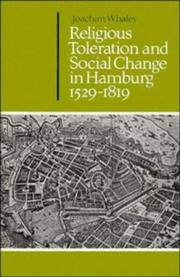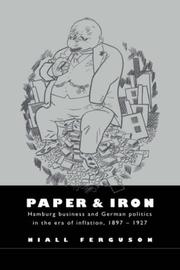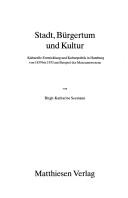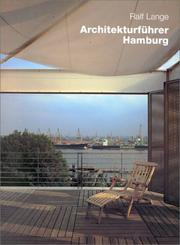| Listing 1 - 10 of 28 | << page >> |
Sort by
|
Periodical
Abstract | Keywords | Export | Availability | Bookmark
 Loading...
Loading...Choose an application
- Reference Manager
- EndNote
- RefWorks (Direct export to RefWorks)
German periodicals. --- #ANTIL9511 --- 070.172 --- Hamburg (Germany) --- -Hamburgo (Germany) --- Hambourg (Germany) --- Hamburgh (Germany) --- ハンブルク (Germany) --- Hanburuku (Germany) --- Hamburg --- Periodicals --- -Hamburg --- Hamburgo (Germany) --- -#ANTIL9511 --- -Hamburg (Germany) --- -Hamburg (Germany) -
Book
ISBN: 1841719897 9781841719894 Year: 2006 Publisher: Oxford : Archaeopress,
Abstract | Keywords | Export | Availability | Bookmark
 Loading...
Loading...Choose an application
- Reference Manager
- EndNote
- RefWorks (Direct export to RefWorks)
Neolithic period --- New Stone age --- Stone age --- Hamburg (Germany) --- Hamburgo (Germany) --- Hambourg (Germany) --- Hamburgh (Germany) --- ハンブルク (Germany) --- Hanburuku (Germany) --- Hamburg --- Antiquities. --- Antiquities
Book
ISBN: 9783835331556 3835331558 Year: 2017 Publisher: Göttingen Wallstein Verlag
Abstract | Keywords | Export | Availability | Bookmark
 Loading...
Loading...Choose an application
- Reference Manager
- EndNote
- RefWorks (Direct export to RefWorks)
Ein »Lehrer mit genialem Profil und Charisma«, ein »sprachsensibler Gedächtnisriese«, der »Einstein der Kunstgeschichte« – Erwin Panofsky ist als wissenschaftliche Ausnahmefigur in die Geschichte eingegangen. Sein Name steht für die Entwicklung und Anwendung einer neuen Methode, der Ikonologie: der Interpretation eines Kunstwerks aus seinem kulturhistorischen Kontext heraus. Wo sich die Kunstgeschichte bisher eher mit Stilkritik und Zuschreibungsfragen beschäftigt hatte, rückten nun große geistesgeschichtliche Horizonte in ihr Blickfeld. Von seinem späteren Wirkungsort Princeton aus hat Panofsky dieser Methode Weltgeltung verschafft. Entstanden aber ist die Ikonologie in Hamburg, wo er an der gerade gegründeten Universität als erster Ordinarius für Kunstgeschichte wirkte – und wo er im Umfeld Aby Warburgs und dessen »Kulturwissenschaftlicher Bibliothek« entscheidende Impulse erhielt.Panofsky wurde 1934 zur Emigration gezwungen. Bis zum Ende seines Lebens hat er die gut dreizehn Jahre, die er in Hamburg verbracht hat, als »die glücklichsten und fruchtbarsten seines Lebens« bezeichnet. In diesem Buch geht es um die Frage nach den Hintergründen: Wie sah die Konstellation aus, die diese intellektuelle Erfolgsgeschichte ermöglichte? Und warum spielte Hamburg in ihr eine so große Rolle?
Panofsky, Erwin --- Art historians --- Historians --- Panofsky, Erwin, --- Homes and haunts --- Hamburg (Germany) --- Hamburgo (Germany) --- Hambourg (Germany) --- Hamburgh (Germany) --- ハンブルク (Germany) --- Hanburuku (Germany) --- Hamburg --- Intellectual life
Book
ISBN: 3529018317 Year: 1987 Publisher: Neumuenster : Helms-Museum,
Abstract | Keywords | Export | Availability | Bookmark
 Loading...
Loading...Choose an application
- Reference Manager
- EndNote
- RefWorks (Direct export to RefWorks)
Saxons --- Ethnology --- Germanic peoples --- Antiquities --- Hamburg (Germany) --- Hamburgo (Germany) --- Hambourg (Germany) --- Hamburgh (Germany) --- ハンブルク (Germany) --- Hanburuku (Germany) --- Hamburg --- Antiquities. --- Hambourg (allemagne) --- Antiquites germaniques --- Age du fer --- Helms-museum (hambourg) --- Fouilles (archeologie) --- Allemagne
Book
ISBN: 3422030336 Year: 1994 Publisher: München Deutscher Kunstverlag
Abstract | Keywords | Export | Availability | Bookmark
 Loading...
Loading...Choose an application
- Reference Manager
- EndNote
- RefWorks (Direct export to RefWorks)
Schleswig-Holstein --- Hamburg --- Art --- Architecture --- Guidebooks --- Guides --- Hamburg (Germany) --- Schleswig-Holstein (Germany) --- Hambourg (Allemagne) --- Schleswig-Holstein (Allemagne) --- Guidebooks. --- Art, Occidental --- Art, Visual --- Art, Western (Western countries) --- Arts, Fine --- Arts, Visual --- Fine arts --- Iconography --- Occidental art --- Visual arts --- Western art (Western countries) --- Arts --- Aesthetics --- Schleswig-Holstein (State) --- Sleswig-Holstein (Germany) --- Schleswig-Holstein (Prussia) --- Hamburgo (Germany) --- Hambourg (Germany) --- Hamburgh (Germany) --- ハンブルク (Germany) --- Hanburuku (Germany) --- Art, Primitive
Periodical
Abstract | Keywords | Export | Availability | Bookmark
 Loading...
Loading...Choose an application
- Reference Manager
- EndNote
- RefWorks (Direct export to RefWorks)
Science --- Hamburg (Germany) --- Hambourg (Allemagne) --- Newspapers --- Journaux --- Conditions économiques. --- Culture. --- Hebdomadaires. --- Politique internationale. --- Politique. --- Germany --- Allemagne RF. --- informatieve tijdschriften --- Duits --- K --- Periodicals --- 070.172 --- -Periodicals --- EJCOMMU EJETUDE EJPOLIT EJRELAT EPUB-ALPHA-Z EPUB-PER-FT ZEIT-E --- Hamburgo (Germany) --- Hambourg (Germany) --- Hamburgh (Germany) --- ハンブルク (Germany) --- Hanburuku (Germany)

ISBN: 0521261899 0521528720 0511523548 Year: 1985 Publisher: Cambridge : Cambridge university press,
Abstract | Keywords | Export | Availability | Bookmark
 Loading...
Loading...Choose an application
- Reference Manager
- EndNote
- RefWorks (Direct export to RefWorks)
The emergence of religious toleration was one of the main features of the development of Western society after the Reformation. While previous research has concentrated largely on ideas of toleration, this study of the Lutheran Imperial City of Hamburg analyses the way in which those ideas were received and gradually implemented. Hamburg was one of the most dynamic mercantile centres of early modern Europe. It attracted substantial numbers of Catholics, Calvinists and Jews. Dr Whaley examines the factors, which influenced the often uneasy relationship with the Lutheran majority. He illuminates the interaction between religion, politics and social change, and shows the impact of international movements and German Imperial legislation on local controversies. An analysis of the major religious and secular festivities, like the centenaries of the Reformation, illuminates those deep-rooted political and ideological factors which cancelled out the obvious economic and humanitarian arguments in favour of open toleration.
Christian church history --- History of Germany and Austria --- anno 1500-1799 --- anno 1800-1899 --- Hamburg --- Religious tolerance --- -Tolerance, Religious --- Toleration --- History --- Hamburg (Germany) --- -Church history --- History. --- -History --- Tolerance, Religious --- Hamburgo (Germany) --- Hambourg (Germany) --- Hamburgh (Germany) --- ハンブルク (Germany) --- Hanburuku (Germany) --- Church history. --- Arts and Humanities

ISBN: 0521470161 0521894220 0511523580 Year: 1995 Publisher: Cambridge Cambridge University Press
Abstract | Keywords | Export | Availability | Bookmark
 Loading...
Loading...Choose an application
- Reference Manager
- EndNote
- RefWorks (Direct export to RefWorks)
Few economic events have had a more profound or enduring impact than the German hyperinflation of 1923, still remembered popularly as a root cause of Hitler's rise to power. Yet many historians have argued that inflationary policies were, on balance, advantageous to post-1918 Germany, both boosting growth and helping to reduce reparations. The scholarly consensus is that there was no viable alternative to inflation. In Paper and Iron Niall Ferguson takes a different view. He argues that inflation was indeed an economic and political disaster, and further that there were alternative economic policies which could have stabilised the German currency in 1920. To explain why these were not adopted he points to long-term defects in the political institutions of the Reich which went back as far as the 1890s and which persisted beyond 1918. The book therefore reveals the Wilhelmine origins of Weimar's failure, as well as casting light on the origins of the Third Reich.
History of Germany and Austria --- anno 1800-1999 --- Inflation (Finance) --- Inflation --- History --- Histoire --- Hamburg (Germany) --- Hambourg (Allemagne) --- Economic conditions --- Conditions économiques --- Conditions économiques --- Arts and Humanities --- Economic conditions. --- Finance --- Natural rate of unemployment --- Hamburgo (Germany) --- Hambourg (Germany) --- Hamburgh (Germany) --- ハンブルク (Germany) --- Hanburuku (Germany) --- Hamburg

ISBN: 378681452X 9783786814528 Year: 1998 Volume: 452 Publisher: Husum: Matthiesen,
Abstract | Keywords | Export | Availability | Bookmark
 Loading...
Loading...Choose an application
- Reference Manager
- EndNote
- RefWorks (Direct export to RefWorks)
Arts --- Hamburg (Germany) --- Intellectual life --- Cultural policy --- -Arts, Fine --- Arts, Occidental --- Arts, Western --- Fine arts --- Humanities --- -Hamburg (Germany) --- -Cultural policy --- Arts, Fine --- Hamburgo (Germany) --- Hambourg (Germany) --- Hamburgh (Germany) --- ハンブルク (Germany) --- Hanburuku (Germany) --- Hamburg --- Cultural policy. --- Intellectual life. --- Arts, Primitive --- Arts - Germany - Hamburg --- Hamburg (Germany) - Intellectual life --- Hamburg (Germany) - Cultural policy

ISBN: 3930698587 Year: 1995 Publisher: Stuttgart Axel Menges
Abstract | Keywords | Export | Availability | Bookmark
 Loading...
Loading...Choose an application
- Reference Manager
- EndNote
- RefWorks (Direct export to RefWorks)
Architecture --- 379.85 --- 72.036 --- 72.03 --- Duitsland --- Hamburg --- Architecture, Western (Western countries) --- Building design --- Buildings --- Construction --- Western architecture (Western countries) --- Art --- Building --- Guidebooks --- Architectuurgidsen --- 20ste eeuw (architectuur) --- Twintigste eeuw (architectuur) --- Architectuur (geschiedenis) --- Architectuurgeschiedenis --- Design and construction --- Hamburg (Germany) --- Hamburgo (Germany) --- Hambourg (Germany) --- Hamburgh (Germany) --- ハンブルク (Germany) --- Hanburuku (Germany) --- Buildings, structures, etc. --- Guidebooks. --- Architecture, Primitive
| Listing 1 - 10 of 28 | << page >> |
Sort by
|

 Search
Search Feedback
Feedback About UniCat
About UniCat  Help
Help News
News